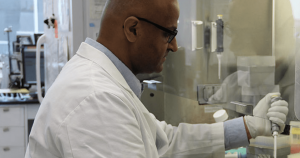Putting his knowledge and passion for research to work to develop solutions to improve patients’ health and quality of life led Yasser Aldhamen, Ph.D., associate professor in the Department of Microbiology, Genetics and Immunology at Michigan State University’s College of Osteopathic Medicine, to collaborate with a TechBio company at the forefront of AI.
 With a novel idea generated in his lab, Dr. Aldhamen received a grant from Atomwise, a San Francisco-based “technology-enabled pharmaceutical company” using AI for small molecule drug screening and discovery. Dr. Aldhamen’s research leveraged Atomwise’s AI to develop drugs that harness the activity of the immune system against cancer cells.
With a novel idea generated in his lab, Dr. Aldhamen received a grant from Atomwise, a San Francisco-based “technology-enabled pharmaceutical company” using AI for small molecule drug screening and discovery. Dr. Aldhamen’s research leveraged Atomwise’s AI to develop drugs that harness the activity of the immune system against cancer cells.
In this research, AI took the place of traditional physical testing of hundreds of thousands of small molecule libraries in the lab. Dr. Aldhamen and the Atomwise drug discovery team instead used machine learning programs to predict molecular binders. The AI-generated compounds were used to target an immune modulatory protein originally discovered in Dr. Aldhamen’s lab that was identified as a molecule that reprograms the immune system to fight cancer cells.
Still in the discovery stage, Dr. Aldhamen believes the discovered small molecules could enhance the immune system’s ability to recognize and kill cancer cells. Using AI saved significant time in the research process and facilitated the discovery of novel compounds.
“Doing this the traditional way takes a lot of time,” Dr. Aldhamen said. “AI could predict the chemical structure of the novel binders and facilities the synthesis of the identified compounds.”
With these promising outcomes, Dr. Aldhamen co-authored “AI is a Viable Alternative to High Throughput Screening: A 318-Target Study,” published in Nature Scientific Reports, detailing the Atomwise AIMS (Artificial Intelligence Molecular Screen) initiative. This study showcases AI as an effective tool for identifying bioactive small molecules.
“In a world where AI is being discussed and its applications are being determined, this is an area where it has truly taken off,” Dr. Aldhamen said. “The questions about how we use it correctly and wisely remain, but at least one use has been for the greater good.”
Atomwise collaborates with researchers globally, but Dr. Aldhamen offered something unique. They screened a molecular library of several million compounds against the biding site of the targeted protein, discovering 72 molecular binders. However, AI alone could not determine their functionality. This is where Dr. Aldhamen’s expertise comes into play.
“The goal of my research is to find inhibitors of the targeted protein, as our previous research identified this protein as a molecule that inhibits immune responses to cancers. Thus, we were aiming to inhibit the inhibitor,” he said.
Atomwise provided 72 molecules and Dr. Aldhamen’s team discovered two active molecules within those through lab testing. Now, the focus is on improving the bioactivity of these two molecules and testing them in tumor animal models to investigate their potential to modulate and activate the immune system (specifically the cytotoxic CD8+ T cells) against cancers. The goal is to confirm that these molecules can enhance the memory and cytolytic activity of CD8+ T cells, shrinking tumors and preventing recurrence, and ultimately leading to testing of these molecules in human clinical trials in the future.
“Now we know that targeting this protein can enhance CD8+ T cell functions and reprogram them in the tumor microenvironment in animal models. We hope to move a step further with these molecules toward discovering a novel anti-tumor agent,” Dr. Aldhamen said, adding that this is his first time using AI in his research and he’s hopeful for the future of patients and the potential benefits.
Dr. Aldhamen believes that incorporating AI strategies in future stages of research will be crucial. “AI is changing everything now,” he said, emphasizing that collaboration between academia and industry is key to success.
This story was originally published by the College of Osteopathic Medicine.
The MSU Innovation Center is seeking companies and organizations interested in AI-driven drug discovery, cancer immunotherapy, and computational biology solutions.
Whether you’re exploring sponsored research, licensing opportunities, or co-developing small molecule therapeutics, immune system modulators, or AI-powered pharmaceutical screening innovations, we’re ready to collaborate.
Interested in partnering with MSU faculty on immunology research and next-generation drug discovery technologies?
